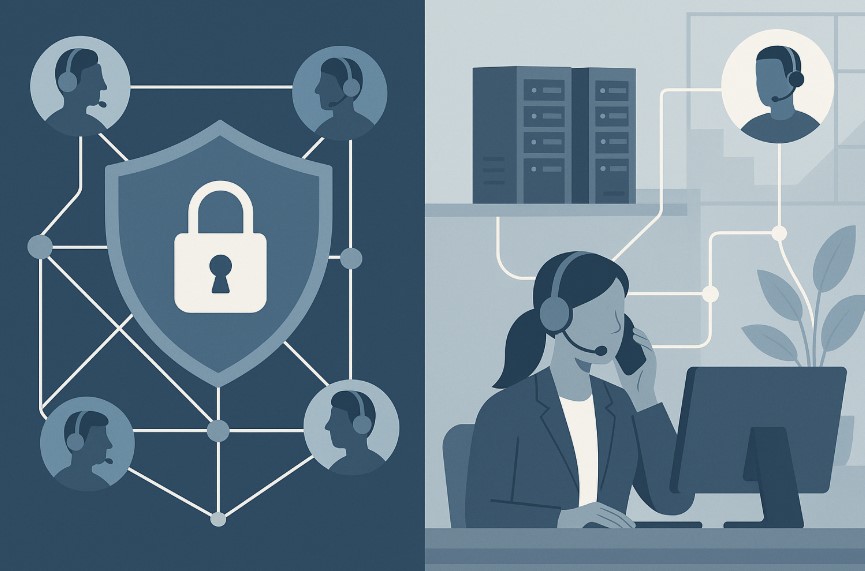
In today’s surveillance-heavy digital age, concerns around online privacy and data security are more pressing than ever. As businesses and individuals turn to VoIP (Voice over Internet Protocol) to make voice and video calls over the internet, one critical question continues to surface Which VoIP services cannot be traced?
While VoIP offers convenience, flexibility, and cost savings over traditional telephony, it also raises privacy concerns. Every online communication leaves a digital footprint, and with increasing state and corporate surveillance, more people are seeking ways to protect their identities and communications.
However, the answer isn’t black and white. No VoIP service can promise total invisibility. Still, some are far more committed to safeguarding user privacy than others. This guide explores the technology behind VoIP traceability, examines privacy-first platforms, and provides practical advice on how to keep your VoIP communication as anonymous as possible.
What Makes Some VoIP Services Traceable While Others Aren’t?
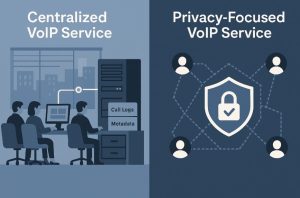
VoIP technology enables voice communication over the internet, which opens both opportunities and vulnerabilities. The traceability of a VoIP call largely depends on how the service handles and transmits user data.
A VoIP call typically transmits through internet packets, often routed through third-party servers. Each step in this journey can potentially be monitored, logged, or intercepted, depending on the design of the VoIP system and the provider’s policies.
Why Some VoIP Calls Can Be Traced?
- Centralised Servers: Many VoIP providers use central servers to route calls. These servers often store logs of call metadata, including caller ID, IP addresses, and timestamps.
- Metadata Storage: Even if the content of a conversation is encrypted, metadata such as who called whom, when, and for how long is often retained. This data is a primary resource for surveillance and investigation.
- Weak or Absent Encryption: Without strong encryption, voice data can be intercepted during transmission. This makes it easier for hackers, governments, or malicious actors to trace and eavesdrop on calls.
- Legal Compliance Requirements: In some jurisdictions, VoIP providers must retain communication records and provide them to authorities upon request. This makes user data accessible and traceable.
On the other hand, privacy-centric VoIP services work to eliminate or mitigate these vulnerabilities through decentralisation, end-to-end encryption, and strict no-logs policies.
What Features Make a VoIP Service Untraceable?
A VoIP service cannot be deemed truly untraceable unless it incorporates a robust set of privacy-focused technologies and policies. Some key factors that define untraceability include:
End-to-End Encryption: Encryption ensures that only the participants in a call can understand the data being transmitted. The data is transformed into unreadable code, which is only decrypted at the receiving end.
No Logging Policy: Privacy-conscious providers avoid storing information such as call times, IP addresses, or contact metadata. This means even if authorities demand data, there’s nothing meaningful to share.
Decentralised Infrastructure: Some VoIP services do not rely on central servers. Instead, they use peer-to-peer (P2P) technology or onion routing, which disperses the data path and makes it difficult to track communications.
Anonymous Sign-Up Process: Services that do not require phone numbers, email addresses, or real names for registration are inherently more private.
Compatible with Privacy Tools: Services that function well with VPNs, Tor, or other anonymising networks provide extra layers of protection.
When evaluating which VoIP services cannot be traced, these features are fundamental in determining their effectiveness.
Which Are the Most Private and Untraceable VoIP Services?
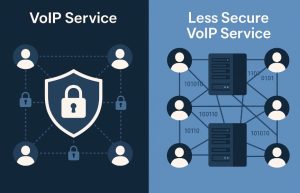
Here’s a detailed examination of several VoIP platforms that offer high levels of privacy and resistance to surveillance:
| Service | Encryption Type | Registration Required | Logging Policy | Infrastructure | Traceability Level |
| Signal | End-to-End (Open Whisper) | Phone number required | No logs | Decentralised | Very Low |
| Tox | Peer-to-Peer, End-to-End | No registration | No logs | Fully decentralised | Very Low |
| Session | Onion Routing + E2EE | No phone/email | No logs | Blockchain-based nodes | Very Low |
| Wire | End-to-End | Email required | Minimal logs | Centralised EU servers | Low |
| Linphone | SRTP + ZRTP | SIP account required | Logs optional | Centralised/Custom | Medium |
| Silent Phone | End-to-End (Silent Circle) | Registration required | Minimal metadata | Private cloud servers | Low |
These services prioritise privacy to varying degrees. Signal, Tox, and Session are the most effective in reducing traceability due to their advanced encryption, anonymous access, and decentralised systems.
Is It Legal to Use Untraceable VoIP Services?
The legality of using encrypted and untraceable VoIP services depends largely on national jurisdiction. In many countries, such tools are legal and even encouraged for protecting personal and business communications. However, some governments view them as tools for subversive activities and impose restrictions.
Permissive Countries
The United Kingdom, the United States, Germany, and other EU nations allow encrypted VoIP use. However, under court orders, providers may be compelled to release metadata if available.
Restrictive Environments
Nations like China, Iran, and North Korea impose severe limitations or outright bans on encrypted communication apps. Using such tools in these countries can lead to criminal charges.
What Legal Boundaries Apply to VoIP Services in Regulated Regions?
The Communications Assistance for Law Enforcement Act (CALEA) in the US mandates that telecommunications systems, including VoIP, must be capable of lawful interception. This does not outlaw privacy tools but means providers must comply when required.
Users must always stay aware of their regional laws when using privacy-centric VoIP applications to avoid unintentional violations.
How Can You Make VoIP Calls More Private and Secure?
Even the most privacy-focused VoIP services can only go so far if users do not take additional steps to safeguard their communications. While apps like Signal, Session, and Tox offer built-in protections, user behaviour plays a critical role in maintaining overall anonymity and preventing traceability.
Below are several strategies to enhance the security and privacy of your VoIP calls:
Why Should You Use a VPN to Mask Your IP Address During VoIP Calls?
A Virtual Private Network (VPN) encrypts your internet connection and routes it through a secure server in a different location. This makes it difficult for ISPs, governments, or malicious actors to trace your IP address and determine your physical location or device identity. When combined with a secure VoIP service, VPNs add a crucial extra layer of anonymity.
How Can You Avoid Linking Personal Information to VoIP Services?
Many VoIP apps request phone numbers or email addresses during registration. To preserve anonymity, choose services that allow anonymous sign-up, or use temporary or “burner” emails and numbers. Refrain from connecting the VoIP app with your social media profiles, contacts, or personal identifiers.
Why Is It Important to Regularly Audit VoIP App Settings?
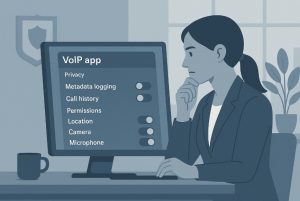
Privacy-focused apps often come with advanced configuration options. Take time to review:
- Whether metadata is logged or transmitted.
- Whether call history is stored locally or in the cloud.
- Which permissions are granted (e.g., access to your location, camera, or microphone when not in use).
Disabling unnecessary permissions and clearing chat/call history regularly helps reduce your digital footprint.
What Role Does End-to-End Encryption Play in VoIP Privacy?
Always ensure the service you’re using employs end-to-end encryption (E2EE) for both voice and video calls. Verify that encryption is enabled by default—some platforms offer it as an option rather than a standard.
How Can Tor or Onion Routing Enhance VoIP Anonymity?
Advanced users seeking maximum anonymity can route VoIP traffic through the Tor network. While not all VoIP services are Tor-compatible, apps like Session are designed to function within onion-routed environments. This can help obscure traffic paths and make tracing efforts more complex.
Why Should You Use Isolated Devices for Secure VoIP Communication?
For high-risk or sensitive conversations, consider using dedicated devices solely for secure VoIP communication. These should not be connected to your regular accounts, emails, or Wi-Fi networks. Using a separate device helps avoid unintentional leaks through background apps or services.
What Are the Challenges in Tracing VoIP Numbers?
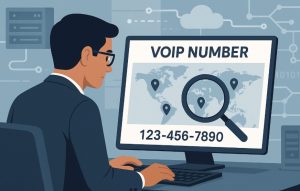
Tracing VoIP numbers presents a range of technical and legal challenges, especially for non-experts. VoIP numbers do not inherently carry location or identity information, unlike traditional phone numbers.
| Challenge | Description |
| Information Access | Access to IP addresses, call logs, and metadata requires legal permissions. |
| Data Protection Laws | Regulations like GDPR limit what data providers can share. |
| Technical Expertise | Law enforcement often lacks the technical skills to trace VoIP independently. |
| VoIP Network Security | Encryption and packet switching make tracing significantly harder. |
Even when law enforcement is involved, they often need the cooperation of VoIP providers and ISPs, along with advanced forensic tools, to identify a caller.
Can VoIP Numbers Be Traced or Monitored?
VoIP numbers can technically be traced, but it requires sophisticated tools and legal backing. Authorities may inspect call detail records (CDRs), network logs, and metadata if available. This process often involves:
- Identifying the source and destination IP addresses
- Reviewing call duration and protocols used (SIP, RTP)
- Using reverse phone lookup services (e.g., Truecaller, Spokeo)
- Contacting the VoIP provider with a warrant or court order
| Method | Effectiveness | Requirement |
| Call Detail Records (CDRs) | High if available | Access via provider/legal process |
| Reverse Lookup Tools | Low to Medium | Works for registered numbers only |
| Network Logs | Medium | Requires system/network access |
| Law Enforcement Support | High | Depends on jurisdiction and cooperation |
Are VoIP Numbers Used for Scams and Fraud?
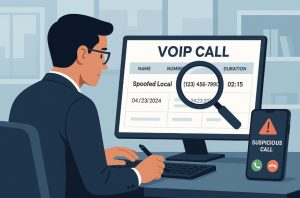
Yes, VoIP numbers are widely used by scammers due to their low cost, global reach, and ability to spoof caller ID. These calls often appear to originate from local numbers, increasing the likelihood of a response.
According to the Communications Fraud Control Association (CFCA), major scam call origins include:
| Country | Common Scam Types |
| United States | IRS, tech support, bank impersonation scams |
| India | Fake customer service and tech scams |
| United Kingdom | Charity fraud, energy and utility scams |
| Pakistan | Loan scams, medical insurance scams |
| Philippines | SMS fraud, vishing scams |
Caller ID spoofing, enabled by tools like SpoofCard or Dingtone, is a major contributor to VoIP fraud. These apps allow attackers to mimic any number or identity, making scams harder to detect.
Can VoIP Calls Be Monitored or Spoofed Legally?
VoIP communications can be monitored under legal authorisation. In many countries, such as the UK and US, government agencies can request data from service providers through court-issued warrants.
Spoofing, while technically easy, is often illegal when used to defraud or mislead. Laws such as the Truth in Caller ID Act in the US prohibit the use of fake caller information for malicious purposes.
Conclusion
The question “Which VoIP services cannot be traced?” reveals a growing demand for privacy in digital communication. While no service is completely beyond reach, platforms like Signal, Session, and Tox come close through strong encryption, decentralised architecture, and strict privacy protocols.
Choosing the right VoIP solution depends on your priorities, whether it’s anonymity, compliance, reliability, or user-friendliness. Opting for trusted VoIP phone services alongside strong endpoint security frameworks ensures better protection for both personal and enterprise communication.
However, these tools should always be used ethically and within the boundaries of local laws. Privacy is a right, but with it comes the responsibility to use technology wisely.
FAQs
Can law enforcement track encrypted VoIP calls?
Encrypted VoIP calls are difficult to track without access to the end devices or call metadata, which typically requires a legal warrant.
Are there VoIP services that don’t store any logs?
Yes, services like Tox and Session operate without logging user activity, making traceability extremely difficult.
How effective are VPNs with VoIP apps?
VPNs add a significant layer of privacy by masking IP addresses, helping protect user identity during VoIP calls.
Can scammers spoof VoIP numbers?
Yes. VoIP spoofing is common and often used in fraud schemes, although it’s illegal in many jurisdictions.
Is using untraceable VoIP apps illegal?
No, but misuse for unlawful activity can result in prosecution. Always ensure usage aligns with local legal frameworks.
Can traditional phone tracing methods work on VoIP?
Not directly. VoIP requires network-level analysis and cooperation from service providers.
Do all private VoIP apps guarantee anonymity?
Not necessarily. While some prioritise privacy, users must also configure settings correctly and use additional tools like VPNs.